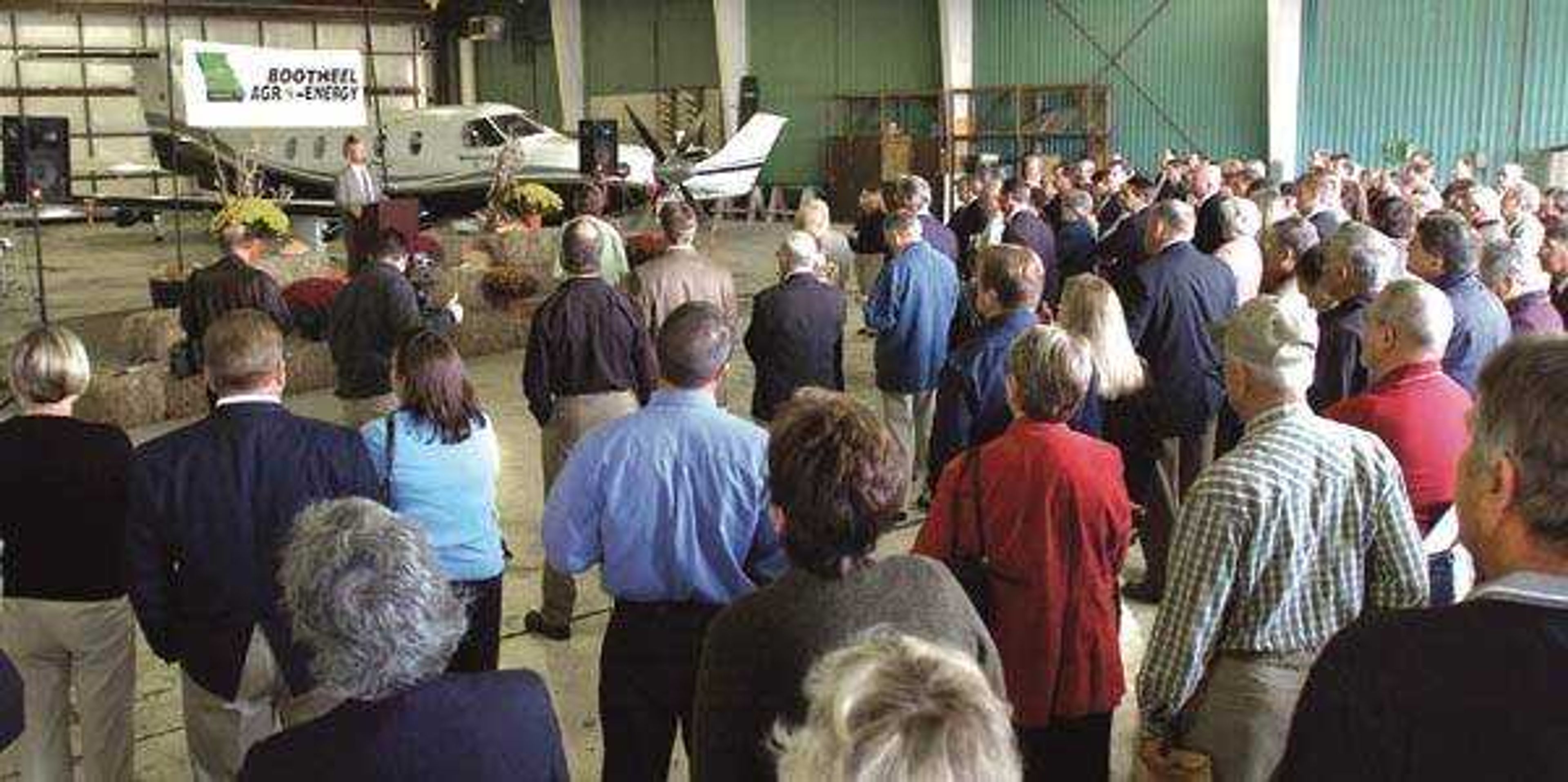Farmers tout ethanol plan in Scott County
A newly formed corporation plans to build a $175 million ethanol plant in Scott County that would annually produce 100 million gallons of the corn-based fuel. The plant would be the largest in Missouri and one of the largest in the nation, company officials say. It would employ 50 to 60 people...
A newly formed corporation plans to build a $175 million ethanol plant in Scott County that would annually produce 100 million gallons of the corn-based fuel.
The plant would be the largest in Missouri and one of the largest in the nation, company officials say. It would employ 50 to 60 people.
Bootheel Agri-EnergyLLC, headed up by Chaffee area farmer David Herbst, announced the project at a news conference Monday morning in a hangar at the Cape Girardeau Regional Airport. About 200 Southeast Missouri farmers, bankers, city and civic leaders showed up for the announcement.
U.S. Rep. Jo Ann Emerson, R-Cape Girardeau, praised the project. She said there's a growing need for ethanol to reduce America's dependence on foreign oil.
"There is nothing that makes more sense to me than getting our fuel from the fields," said Emerson.
Charlie Kruse, president of the Missouri Farm Bureau, said a "great deal of planning and thought" went into the latest ethanol venture.
Lt. Gov. Peter Kinder, R-Cape Girardeau, also championed the proposed development.
A group of 23 people, mostly area farmers, founded the corporation on Sept. 26.
Herbst said board members will invest in the venture.
The company plans to raise 40 percent of the money needed and obtain loans for the other 60 percent, he said.
Government regulations prevent the board from disclosing any more about the financing of the project at this time, Herbst said.
Herbst knows some public skepticism exists.
A Kansas City-area developer two years ago proposed building a smaller ethanol plant at the Nash Road industrial park, but so far has failed to secure financing for the project.
A group of Malden, Mo., area farmers also have explored the possibility of constructing an ethanol plant in that part of the Bootheel. But financing remains a hurdle for that project too.
Herbst said he's confident Bootheel Agri-Energy will secure the money needed to build an ethanol plant.
"We have not nailed down a site," Herbst said.
The board's looking at three possible sites: Two in Sikeston, Mo. -- the city's industrial park and a site near Sikeston's coal-fired power plant; and the Southeast Missouri Regional Port at Scott City.
At least a 40- to 50-acre site is needed, he said. A site of 100 acres or more would be better because it would allow for future expansion, Herbst said.
The venture would involve building a coal-fired power plant and an ethanol plant. The power plant would generate the steam and electricity needed to operate the ethanol plant, he said.
Herbst said the group hopes to settle on a site within the next 30 to 45 days.
With proper funding, construction could begin by next spring. The plant could be in operation within a year and a half, he said.
The ethanol plant would use 35.6 million bushels of corn annually. Herbst said that's feasible given the amount of corn grown in the region.
"We will use less than 40 percent of the corn produced within a 70-mile radius," he said.
Missouri currently has three ethanol plants, all farmer-owned cooperatives in the northern part of the state. The three plants combined can produce 105 million gallons of ethanol annually.
Herbst said a larger plant like the one proposed for Southeast Missouri makes better business sense because it would be more profitable. There's a greater economy of scale for a plant that will produce 100 million gallons of ethanol annually, he said.
While Missouri's existing ethanol plants are owned by farmers, Herbst said his group decided to form a limited liability corporation instead so that it could seek investors besides farmers.
With a farmers' cooperative, only farmers could invest in the business, Herbst said.
Bootheel Agri-Energy plans to burn high-sulfur coal from Southern Illinois to power its ethanol plant. The company will have to install anti-pollution equipment to meet government clean-air regulations, he said.
Herbst said coal's less expensive than natural gas right now. It costs $2.30 per million BTU for coal-fired power compared to $12 for natural gas,, he said.
A BTU is the amount of heat required to increase the temperature of a pound of water by 1 degree Fahrenheit.
The new plant would be designed to operate on either coal or natural gas, whichever was more economical at a particular time.
Herbst said the ethanol plant likely would operate initially on natural gas while the coal-fired system is constructed.
The plant would produce grain alcohol. It then would be transported to fuel distribution facilities like the one in Scott City and blended with gasoline.
In addition to the alcohol created from fermented corn, the manufacturing process would create 320,000 tons a year of dried distiller grains for livestock feed, Herbst said.
mbliss@semissourian.com
335-6611, extension 123
Connect with the Southeast Missourian Newsroom:
For corrections to this story or other insights for the editor, click here. To submit a letter to the editor, click here. To learn about the Southeast Missourian’s AI Policy, click here.










